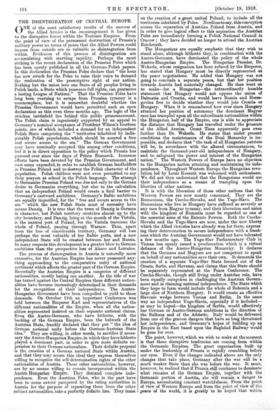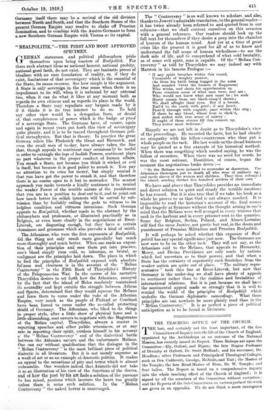THE DISINTEGRATION OF CENTRAL EUROPE.
ONE of the most satisfactory results of the success of the Allied Armies is the encouragement it has given to the disruptive forces within the Teutonic Empires. From the point of view of the permanent destruction of Prussia's military power no terms of peace that the Allied Powers could impose from outside are so valuable as disintegration from within. Evidences of this process of disintegration are accumulating with startling rapidity. Perhaps the most striking is the recent declaration of the Prussian Poles which has been openly published in all the German-Polish papers. In this declaration the Prussian Poles declare that " the hour has now struck for the Poles to raise their voice to demand the realization of the prescriptive right of our nation. Nothing but the union into one State of all peoples living in Polish lands, a State which possesses full rights, can guarantee a lasting League of Nations." That the Prussian Poles have long been yearning to escape from Prussian tyranny is a commonplace, but it is somewhat doubtful whether the Prussian Government would have permitted such an open declaration as this even three months ago. The logio of the stricken battlefield lies behind this public pronouncement. The Polish claim is ingeniously supported by an appeal to Germany's nominal acceptance of President Wilson's fourteen points, one of which included a demand for an independent Polish State comprising the " territories inhabited by indis- putably Polish populations, which should be assured a free and secure access to the sea." The German Government may have nominally accepted this among other conditions, but it is in direct opposition to the policy which Prussia has pursued ever since the days of Prince Bismarck. Immense efforts have been devoted by the Prussian Government, and vast sums expended, in order to establish German landholders in Prussian Poland and to destroy the Polish character of the population. Polish children were not even permitted to say their prayers at school in the Polish language. The attempt to Germanize Prussian Poland was due not only to the German desire to Germanize everything, but also to the calculation that an independent Poland would create a final barrier to Germany's eastward ambitions. Germany's Baltic ambitions are equally imperilled, for the " free and secure access to the sea " which the new Polish State must of necessity have means Danzig. It is true that the town of Danzig is German in character, but Polish territory stretches almost up to the city boundary, and Danzig, lying at the mouth of the Vistula, is the natural port of Poland, for the Vistula traverses the whole of Poland, passing through Warsaw. Thus, apart from the loss of considerable territory, Germany will lose perhaps the most valuable of her Baltic ports, and a new independent State will be created between her and Russia. In many respects this development is a greater blow to German ambitions than the prospective loss of Alsace and Lorraine.
The process of disintegration in Austria is naturally more extensive, for the Austrian Empire has never possessed any- thing approaching to the comparative unity of national sentiment which affects the greater part of the German Empire. Essentially the Austrian Empire is a congeries of different nationalities, mostly hating one another. As the tide of war has turned against the Central Empires these different nation- alities have become increasingly determined in their demands for the recognition of their independence. The Austro- Hungarian Goverment have been compelled to yield to these demands. On October 11th an important Conference was held between the Emperor Karl and representatives of the different nationalities of the Empire, when all the nation- alities represented insisted on their separate national claims. Even the Austro-Germans, who have hitherto, with the backing of the German Empire, been the bulwark of the Austrian State, frankly declared that they put " the idea of German national unity before the German-Austrian State idea." They are willing, in other words, to sacrifice if neces- sary the Austro-Hungarian Empire, in which they have hitherto played a dominant part, in order to give more definite ex- pression to their German nationalism. Their definite proposal is the creation of a German national State within Austria, and that they may secure this ideal they express themselves willing to recognize the self-determination rights of the other nationalities of Austria. These other nationalities, however, are by no means willing to remain incorporated within the Austro-Hungarian Empire. They demand complete inde- pendence. Even the Austrian Poles, who in the past have been to some extent pampered by the ruling authorities in Austria for the purpose of separating them from the other subject nationalities, take a perfectly definite line. They insist on the creation of a great united Poland, to include all the territories inhabited by Poles. Needless to say, this conception means the separation of Austrian Poland from Austria, and in order to give logical effect to this aspiration the Austrian Poles are immediately forming a Polish National Council in Cracow ; they have decided no longer to attend the Austrian Reichsrath.
The Hungarians are equally emphatic that they wish to stand alone, although hitherto they, in combination with the Austro-Germans, have dominated the, policy of the whole Austro-Hungarian Empire. The Hungarian Premier, Dr. Wekerle, whose resignation has been refused by the Emperor, has stated that Hungary must be directly represented at the peace negotiations. He added that Hungary was not going to conclude a separate peace, but that her position towards Austria had materially changed. He then went on to make—for a Hungarian—the extraordinarily humble statement that Hungary would not oppose the union of Dalmatia and Croatia, and would leave Bosnia and Herze- govina free to decide whether they would join Croatia or Hungary. When it is remembered how ever since Hungary attained her position of autonomy the dominant Magyar race has trampled upon all the subordinate nationalities within the Hungarian half of the Empire, one is able to appreciate the distance that Hungary has travelled under the pressure of the Allied Armies. Count Tisza apparently goes even further than Dr. Wekerle. He states that under present conditions the maintenance of the Dual Monarchy is im- possible, and declares that "the task of all Hungarian patriots will be, in accordance with the altered circumstances, to maintain the thousand-year-old independence of Hungary, and to safeguard the power and interest of the Hungarian nation." The Western Powers of Europe have no objection to the Hungarian nation attaining- and maintaining its inde- pendence. Throughout Western Europe the Hungarian revo- lution led by Louis Kossuth was welcomed with enthusiasm. We did not then understand that the Hungarians would use their independence as a means of trampling upon the liberties of other nations.
It is with the liberation of those other nations that the Western Powers are now mostly concerned. They are the Rumanians, the Czecho-Slovaks, and the Yugo-Slays. The Rumanians who live in Hungary have suffered as severely as any race from Magyar tyranny, and their liberation and union with the kingdom of Rumania must be regarded as one of the essential aims of the Entente Powers. Both the Czecho- Slovaks and the Yugo-Slays are now, under the new liberty which the Allied victories have already won for them, express- ing their determination to secure independence with a frank- ness which the Austrian Government would not have tolerated a few months ago. The Yugo-Slav Parliamentary Club in Vienna has openly issued- a proclamation which is a virtual defiance of the Austro-Hungarian Monarchy. It declares that the Germans and Magyars are not competent to speak on behalf of any nationalities save their own. It demands the creation of a separate Yugo-Slav State formed out of the Croats, Serbs, and Slovenes, and claims that this State should be separately represented at the Peace Conference. The Czecho-Slovaks, though still living under Austrian rale, have been equally outspoken in challenging the Austrian Govern, ment and in claiming national independence. The State which they hope to form would include the whole of Bohemia and a large slice of Northern Hungary. It would create an effective Slavonia wedge between Vienna and Berlin. In the same way an independent Yugo-Slavia, especially if it included— as may be hoped—the kingdom of Serbia, would effectively bar German or Austro-German ambitions in the direction of the Balkans and of the Adriatic. Italy would be delivered from one of the gravest dangers that have so long threatened her independence, and Germany's hopes of building up an Empire in the East based upon the Baghdad Railway would be gone for ever.
The point, however, which we wish to make at the moment is that these disruptive tendencies are coming from within the Germanic Empires. The great organization built up under the leadership of Prussia is rapidly crumbling before our eyes. Even if the changes indicated above are the only changes that take place, Germany after the war will be a much weaker State than- she was before the war. It must, however, be realized that if Prussia still continues to dominate what remains of the German Empire, together with the Germanic portion of Austria, she will remain a danger to Europe, necessitating constant watchfulness. From the point of view of Western Europe and from the point of view of the peace of the world, it is greatly to be hoped that within Germany itself there may be a revival of the old . division between North -and South, and that the Southern States of the present German Empire may resolve to shake off Prussian domination, and to combine with the Austro-Germans to form anew Southern German Empire with Vienna as its capital.



































 Previous page
Previous page